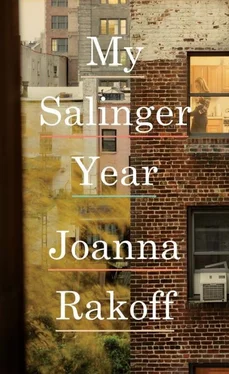But Staten Island was cheaper, she said, than any of the neighborhoods to which my other friends were moving, most of them in Brooklyn: Carroll Gardens, Cobble Hill, the Fifth Avenue part of Park Slope, Fort Greene and Clinton Hill, a nebulous square off Flatbush that we would eventually learn to call Prospect Heights, and, more than anywhere else, my neighborhood, Williamsburg, and its neighbor to the north, Greenpoint, areas so densely populated with friends, and friends of friends, and distant acquaintances, or simply the loose network of Oberlin-Bard-Vassar-etc. that I couldn’t buy a cup of coffee at the L without running into several people I knew. Often, when I went out for breakfast on Sunday morning, at the Mediterranean place around the corner, I was seated by a dancer who’d been a year ahead of me at school and waited on by a painter who’d been two years ahead. At night, Don and I could meet Lauren for Thai food, or Leigh and Allison for gin and tonics at the Rat Pack–era bar on Bedford and watch an alternative circus, which involved one college friend of mine eating fire, another clowning in the style of Jacques Lecoq, another riding a unicycle and playing trombone. For me, this was heaven, heaven that could only be improved by Jenny moving in down the street.
For Jenny, though, it turned out this was hell. She had cast off such childish things. Heaven was, she told me, eyes shining, driving to a large supermarket and unloading a week’s worth of groceries directly into her apartment from her designated parking spot. Like me, Jenny was a child of the 1970s—her mother an Afro-sporting feminist who published poetry in Lilith and ran a women’s shelter—but she seemed to be morphing into a housewife from the 1950s, by sheer force of will. Her wedding, at the Central Park Boathouse, was to be a royal affair.
One unseasonably warm day toward the end of March—the sort of day when you realize that spring might actually arrive at some point, that it won’t be winter forever—I walked across Forty-Ninth Street, to Sixth Avenue, checked in with security, took the elevator up to the umpteenth floor, and met Jenny at her cubicle, which was large and white and newly constructed, at the center of an enormous open room filled with dozens and dozens of identical cubicles, their interior walls lined with pinned-up photos of boyfriends or husbands or smiling children, with postcards from faraway places. Jenny had a photo of Brett and one of her sister, Natalie, smiling goofily. But her cubicle was dominated by work: alongside the photos were printouts of e-mails. She gestured to these, made a monster face, and moaned, “BLARGH!”
“What?” I asked, laughing.
“My boss has decided that our office is going to be completely paperless,” she explained.
“How is that possible?” Now this sounds like a ridiculous question. But in 1996 it truly did seem impossible to eliminate paper from an office. Especially an office devoted to the production of books .
“Well, we’re going to do everything by e-mail. No more interoffice memos.” She pointed to her desk. “It’s driving me insane . Every two seconds I get ten new e-mails about NOTHING. She’ll send out something that I need to look at while I’m working—like updated style sheets—and I just have to print it out, but there’s no printer on this floor, so I have to walk downstairs or upstairs to the printer, and half the time someone has taken my printouts accidentally, so I have to come back here and print them again, then go back downstairs and AGH!”
This didn’t sound like such a big deal to me, but I said nothing. I worked in an office that considered the photocopier a newfangled invention. What did I know.
“But what’s really driving me crazy is that no one talks to each other anymore. At all.” She widened her lovely brown eyes and stretched out her mouth. “So, my boss is just right there”—she pointed across the room to an empty cubicle identical to her own—“but instead of getting up, walking the fifteen feet over to my desk, and saying, ‘Hey, Jennifer, how close are we to being done on the Mexican immigration chapter,’ she e-mails me, from across the room ! And I then have to e-mail her back, from across the room .” She smacked her hand into her head for emphasis.
“Could you just get up and answer her in person?” I asked.
“Apparently not! I tried that, and she looked at me like I was a complete weirdo and then said, ‘I can’t talk right now. Could you just e-mail me?’ ”
“That,” I agreed, “is crazy.”
Jenny put on her coat—a navy-blue duffle she’d worn for ages, in which she looked about twelve—and we headed out to the hallway and down so fast in the elevator that my ears popped. In the lobby, her mood shifted, her buoyancy gone. We had left her territory and were out in the world, where anything could happen. In high school, in college, we’d talked about everything, talked for hours and hours, through long road trips and whole nights, a unified front against the world. But we were no longer fully unified, and we didn’t quite know how to face the world with these points of departure between us.
This is, I know, an old story.
In silence, Jenny and I walked across the southern end of Rockefeller Center, to the little Dean & DeLuca outpost, and scanned the prewrapped sandwiches in the refrigerated case. I refrained from looking at the prices—everything would be too much, so what did it matter—but chose mozzarella and tomato because I suspected it was the cheapest, being vegetarian. “Hmm,” said Jenny, “should I have the nine-dollar bowl of soup or the eight-dollar sandwich?” She picked up the latter. “The extremely tiny eight-dollar sandwich.” She raised her eyebrows. “Or maybe I should just have an enormous three-dollar doughnut.” I loved her all over again, even though she was marrying a person who had told me that he “didn’t really read fiction,” because it was hard for him to get around the fact that “it’s all lies.”
“How’s Don?” she asked in a falsely cheerful voice. She was fiercely loyal to my college boyfriend and baffled by my defection to Don. Brett had just sent off his law school applications. “How’s his novel?”
“I think he’s pretty much done.” Jenny was ostensibly a writer herself. In high school, in college, her life began and ended with poetry. Her work was beautiful, brilliant, strange. But since meeting Brett, she rarely talked about poetry anymore. “He’s just making final changes. He seems to be working over every sentence a thousand times.”
“Mmm,” said Jenny, resting her cheek on her hand. She looked tired, I noticed. Though her cheeks were rosy, as always, and her eyes bright, there was a drawn look to her face, dark circles under her eyes. “Have you read it?”
“He won’t let me. He doesn’t want anyone to look at it until it’s completely done.”
“I get that,” she said, chewing thoughtfully. Her sandwich, on some kind of flat, oily bread, looked much better than mine. “Have you read any of his stuff?”
I hesitated. In fact, the previous week, he’d given me a story, for the first time. I’d come home from work to find him leafing through papers at his desk. Nervously, he clipped a few together and handed them to me, before I’d even taken my coat off, then put one hand on my shoulder, another on my hip, and folded me down onto the couch. “Sit,” he said, laughing. “Stay.” He stood, though, pacing lightly back and forth in front of me. “I wrote this a long time ago—two or three years ago—and it’s very different from what I’m working on now. But it’s maybe the only successful short story I’ve written.” He paused, running his hands through his hair. Without pomade, it was thin and lank, a few white threads among the brown. “I’m not really a story person. I’m a novelist.” He smiled. “I think big. Big picture. Big ideas. Stories are miniature.”
Читать дальше












